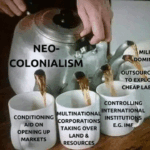by Alisha Archie
From the Text: “In ‘Unsettling the Coloniality of Being/Power/Truth/Freedom’, Sylvia Wynter (2003) argues that during the Renaissance, the West invented a new definition of what it means to be human which provided the foundational basis of modernity…Wynter’s (2003) argument builds on Franz Fanon (among others) who in ‘Black Skin, White Masks’ (2008) – focusing on the Black colonial experience, particularly in the Antilles where he grew up – recognizes through a self-reflective, psychological lens that the European colonial powers systematically erased and suppressed authentic Black identities and instead imposed racist, inferior identities on the colonized…Finally, I have deliberately chosen to leave remnants of the fixture visible around the edges of the Mirror for Nonwhite Peoples as a poignant reminder that the new descriptive statement of the human, Man, is fabricated.”
Author: thelionandthehunter
Women’s Struggle in Biafra: The Nigerian Civil War as a Direct Consequence of Colonialism
by Carolin Felden. Main Article in German language.
Between 1967 and 1970, Nigeria was engulfed in a devastating war between the Nigerian government and the secessionist Republic of Biafra. The war concluded nearly three years later with Nigeria’s victory, yet it left in its wake a staggering toll of over two million lives lost. Notably, the role of women in the Biafran struggle was multifaceted; they emerged as warriors, scholars, farmers, and providers, playing a crucial role in sustaining the republic during its tumultuous existence. While commonly referred to as the “Nigerian Civil War,” this article contends that such terminology inadequately captures the war’s broader context. The legacy of British colonialism in Nigeria (1914-1961) is posited as a significant factor contributing to the war’s outbreak (cf. Richardson 2019: 79). Consequently, this article seeks to elucidate that the Biafran quest for independence was not merely a confrontation with the Nigerian government but rather a profound struggle against neocolonial foreign domination. Special emphasis will be placed on the indispensable contributions of Biafran women to this cause.
Hierarchies of Global Capitalism – Periphery vs. Centre
by Jakob Drews
The global capitalist system is characterized by inequality through exploitation and dependency. These attributes were fostered by European colonization. Different parameters of dependency were institutionalized since the “independence” of the formally colonized. They characterize the structure of the international system. Some economies are profiting from the global capitalist system, some are doomed to depend on those who profit. This structure is binary and consists of the profiting centre and the exploited periphery. Both substructures were not “born” into their respective position. They were constructed. In this work, I am stressing the relationship between centre and periphery from a historical perspective. What constituted the centre in the centre and why is the periphery dependent on the centre?
Private Security Companies in the extractivist industry in Africa
by Konstantin von Kleist-Retzow
Private Security Companies perform services that are integral to maintaining extractivism. Consequently, this work claims that PSCs safeguard neocolonial extractivist practices in Africa and thereby reproduce and intensify global power imbalances in political, economic, and social terms…
The involvement of the Rockefeller Foundation in the Green Revolution: Structural Underdevelopment through Agricultural Reforms
by Madalena Kresimon
The aim of this paper is to illuminate the Rockefeller Foundation started Green Revolution, with its strength and weaknesses in the context of its political meaning. The questions I will be trying to answer are which political goals it served and in which patterns of neocolonialism, global injustice and structural underdevelopment can be observed in these agrarian reforms. Central will be Mexico, were the program started, and India, as it has often been focused on in the perception of the green revolution, also because of the political role it played…
Glossary of the Institutionalized Regime of Underdevelopment
by Lisanna Kelz, Aikaterini Mouzaki, Zanê Aradine and Isabel Pearce
A Glossary narrating the Institutionalized Regime of Underdevelopment: A critical reflection of the market-oriented international order, reproducing neocolonial exploitation patterns. The glossary is divided into three sections: Institutions; Country Groupings, Unions and Organizations; and Terms of Economic and Financial Governance…
The Border Regime
by Lisanna Solara Kelz
The author about the Border Regime project: “The intent of this project is to approach the Border Regime in a rather non-scientific way and show how the Border operates, functions, works and is reproduced every day. Therefore, I try to give an overview and insight on the different ways the border appears in and beyond our daily live, within our state and beyond its official borders. I chose Prezi as a design where everyone can look at the topics they are interested in and chose the order in which they want to explore them…”
Toppling Statues, Challenging Silences and Systemic Oppression: Protest as an opportunity to critically reflect History
by Camilla Salim Wagner
“…Starting from the activists’ demands and claims regarding the violent character of some statues, I discuss howstatues are connected to systemic oppression and the role silence plays in that dynamic, as well as the relevance of the act of taking those symbols down. Rather than directly engaging with the different arguments of opponents and defenders of specific statues, I approach the topic with a theoretically informed perspective, reflecting not only about the statues but how we, as Western societies, understand our History. Besides the meanings and implications of who is (and isn’t) represented by statues, I question the power relations shaping our narratives of history and their political and social implications…”
Silences around the Memory of the Mpondoland Revolts in South Africa (1950s-1961)
by Jana Roth
“…This revolutionary movement called Congo Movement or iKongo opposed the white nationalist government by incorporating approaches of witchcraft and sorcery to create a separate nation and fight against the apartheid state. The fact that very little published work without a systematic study of the Mpondo resistance exists, is an example of resistance by the marginalized that remains widely hidden. In this context, urban anti-apartheid struggles like the Sharpeville and Langa protests are well remembered, yet rural resistances like the Mpondoland revolts remain largely absent in historical narratives (Kepe & Ntsebeza 2011: 3ff.). This points to different aspects of silence revolving around the memory of these revolts, especially in contemporary discourses. In the case of iKongo, it is relevant to study the silences around womxn and around witchcrafts, since both remain subjects of silence and prejudice throughout history…”
Norms of Beauty in India Fair is Beautiful: A legacy of Colonialism and Globalization
by Khesraw Majidi This paper describes and analyzes the norms of beauty in India by considering the whiteness of people’s skin, Caucasian looks, body shape, and its impact on social status. The paper also analyzes the relationship between skin color,Continue reading… Norms of Beauty in India Fair is Beautiful: A legacy of Colonialism and Globalization









